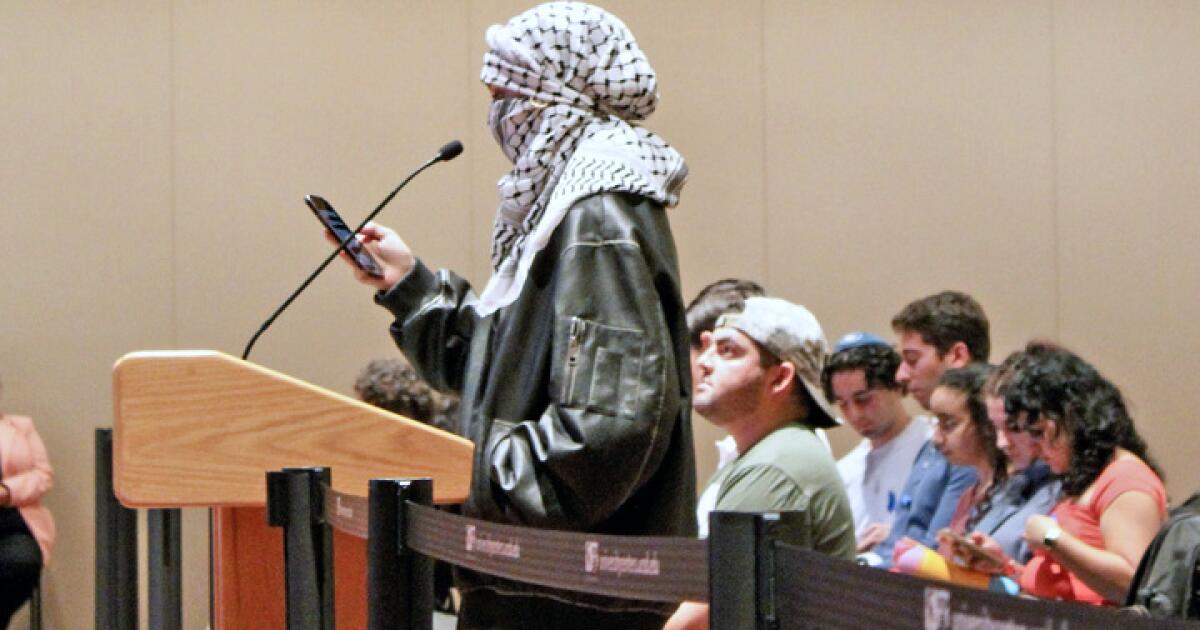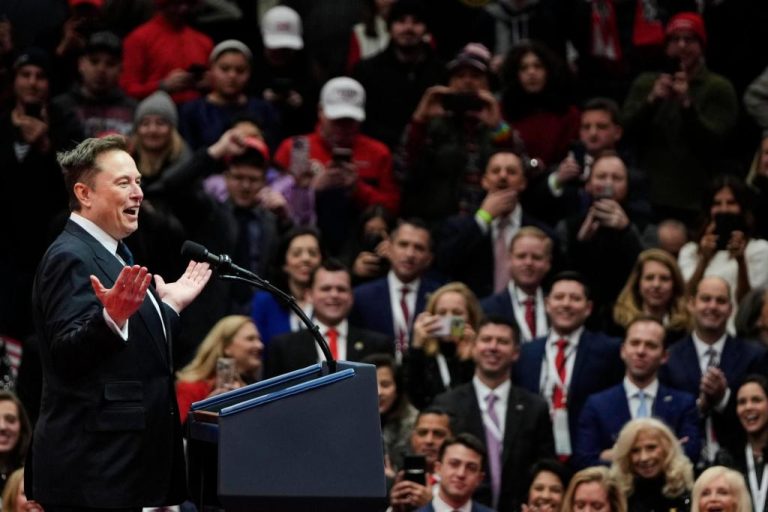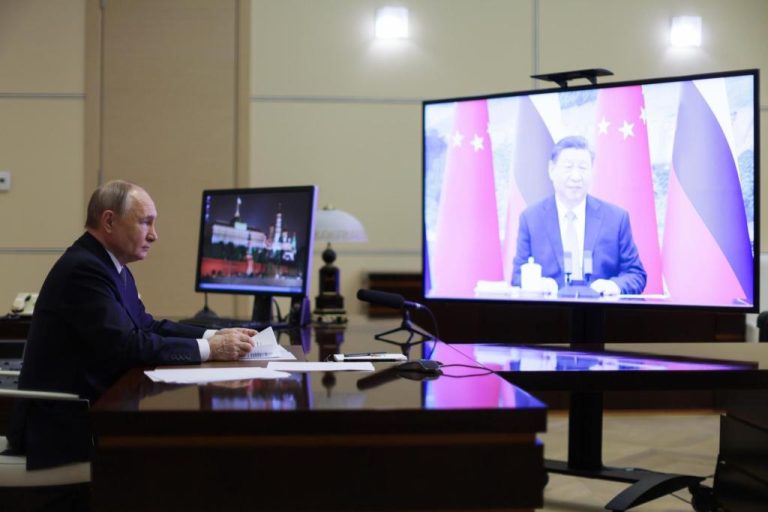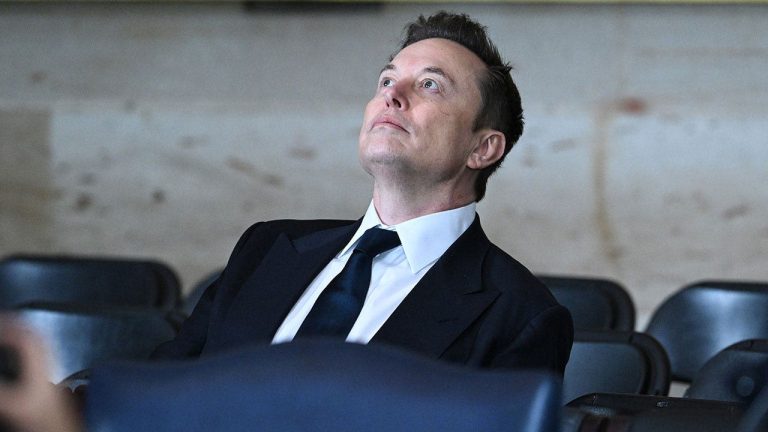

UC San Diego’s student council condemned antisemitism Wednesday night, under strong urging from Jewish students who said the board has been ignoring their existence and safety amid the hot rhetoric arising from the Israel-Hamas war.
The action came after a month of growing concerns among both Jewish and pro-Palestinian students that inflammatory remarks are creating a hostile environment, and that the university’s administration has been slow to deal with the situation.
Associated Students, which helps oversee undergraduates, had decided against condemning antisemitism a week earlier during a vote taken in the middle of the night. Late Wednesday, the board reversed its decision after hearing speeches that included pro-Palestinian speakers who say they are the ones being ignored and persecuted.
There were 21 yes votes, 1 no and 5 abstentions. The remarks represented some of the most charged political exchanges at UCSD since anti-Vietnam war protests half a century earlier.
Those students speaking in support of Palestinians were largely represented by the local chapter of Students for Justice in Palestine, which did not respond to a request from the San Diego Union-Tribune for a comment on the vote.
Many of the nearly 40 students who spoke to the board said they been insulted, harassed or threatened since the war began on Oct. 7 and now fear stepping on campus.
Some students told the Union-Tribune they are especially concerned about being safe on Library Walk, a corridor where pointed political conversations are not unusual. The area leads to UCSD’s most iconic building, Geisel Library.
Students from both sides have criticized Chancellor Pradeep Khosla’s public statements, which some have called insufficiently thorough, timely and empathetic. Other university leaders across the country are also receiving heat from students and faculty, including Harvard’s Claudine Gay, who was accused of being slow to respond to the Oct. 7 attack Hamas launched against Israel.
Khosla has met with Hillel of San Diego. And he is scheduled to meet locally next week with the president of the University of Haifa, according to a spokesperson for the Israeli school. But it is unclear whether Khosla has met with pro-Palestinian groups.
The chancellor has declined several requests from the Union-Tribune to talk about the situation on campus.
The controversy comes at a time when many students at the nation’s colleges and universities are being very cautious about what they say for fear of being ostracized on social media or in person.
Earlier this week, Brandeis University outside Boston announced that it would no longer support its campus’ chapter of the National Students for Justice in Palestine. The school, which is roughly one-third Jewish, told the media that NSJP supports Hamas’ war against Israel.
During Wednesday’s Associated Students meeting at UCSD, most SJP members and some Jewish students declined to state their names. And many SJP members wore masks or kuffiyeh scarves to hide their faces for fear of being harassed. Pro-Palestinian supporters also have worn facial coverings during demonstrations at other schools, including Harvard, UC Berkeley and New York University.
Wednesday’s discussion stemmed from an incident at the AS board’s meeting on Oct. 25.
Dozens of SJP members showed up during the board’s public comment period, stood behind student senators and pressed the board to endorse a statement in support of Palestinians, a university videotape of the meeting showed.
“The University’s disregard for the killing of innocent civilians in Gaza is irresponsible, biased, and dehumanizes Palestinian life,” that statement read in part. “Furthermore, the university’s implicit categorization of Palestinians as ‘terrorists’ and ‘antisemitic’ perpetuates the racist notion that the offensive was unprovoked and done solely to be ‘launched on a major Jewish holiday.’ ”
A student who identified herself as Alicia, without giving her last name, told the board “almost everyone in this room disgusts me … I have literally faced so much hatred … I have seen mockery.”
AS later unanimously endorsed the SJP statement by a vote of 24 to 0. Several members later said they had felt pressured to do so.
The vote angered Hillel of San Diego, which is located next to campus. There was particular concern about an SJP member’s use of false, antisemitic tropes about Jewish influence in the media and finance. The remark appears at the 22:49 minute moment of the video recording.
One AS member, Ivan Ramirez, then co-authored a resolution condemning antisemitism on campus.
His statement also said, “Associated Students of UC San Diego apologizes for not properly researching and reviewing content contained in the Students for Justice in Palestine Statement Release and for not ensuring proper consideration and representation of the Jewish community at UC San Diego before approving an endorsement” for the SJP statement.
Jewish students turned out in force for the board’s Nov. 1 meeting, telling AS that they’ve been been increasingly targeted in the wake of the war. Some used the term “Jew-hatred” instead of antisemitism.
The board defeated Ramirez’s resolution last week with 6 members voting yes, 11 voting no and 9 abstaining.
But Ramirez re-introduced his resolution on Wednesday, and dozens of Jewish students and SJP members spoke, many reading impassioned statements off their cellphones.
“We are only halfway through the quarter, and my friends and I have been called terrorists, murderers, rapists,” one unidentified pro-Palestinian speaker said. “We’ve received death threats, been followed to our cars, are constantly given looks.”
“Why is it that I have to miss class and work for the past month to fight for Jewish equality on this campus when it is (the board’s) job to represent all Jewish students equally?” an unidentified Jewish student asked. “The last time the world was silent to this extent of Jewish discrimination 6 million Jews were murdered.”
When it came time to vote Wednesday night, the board removed references to Students for Justice in Palestine from the draft resolution, due to concerns they would be disparaging, and focused on condemning antisemitism.
Ramirez expressed ambivalence Thursday.
“Overall, I think that the resolution that ended up passing was somewhat performative and did not achieve its intended goal of representing the specific concerns of the Jewish population,” he said.
“While I am still glad that something was passed condemning Jew-hatred and antisemitism, we should not have removed an apology we were going to make for failing to research the information in the SJP letter we endorsed on Oct. 25.”







